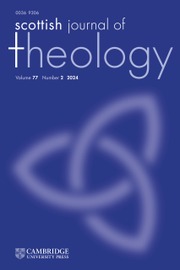-
- Get access
- Contains open access
- ISSN: 0036-9306 (Print), 1475-3065 (Online)
- Editor: Professor Ian A. McFarland Candler School of Theology|Rita Anne Rollins Building|1531 Dickey Drive|Atlanta, Georgia 30322 USA
- Editorial board
Latest articles
April Article of the Month
Augustine on the beatific vision as ubique totus
Gerald P. Boersma
Abstract
A constant in Augustine's long literary career is his understanding of God's presence as ubique totus, or ‘whole and everywhere’. I will first consider how Augustine came to perceive of the divine presence in this life (here I will look especially at the Confessions); second, how he theologically articulates the nature of the divine presence (here I will draw on Ep. 187), and, finally, how he understands the divine presence in the life to come (and here I will focus on the conclusion of the City of God). I suggest that a fundamental continuity obtains between how Augustine understands seeing God in this life and the next and that this continuity is predicated on his conception of the divine presence as ubique totus.
Religious studies blog

-
From the Author; Astrobiology and the Christian Doctrine with Revd Prof Andrew Davison
- 13 March 2024,
- The Revd Prof Andrew Davison is the Starbridge Professor of Theology and Natural Science, holding the professorship endowed by the novelist Susan Howatch.…...

-
The importance of open access publishing for the arts and humanities
- 20 December 2023,
- Between 2012 and 2014, I held a two-year Wellcome Trust Research Leave Award (WT096499AIA) for a project on women surgeons in Britain, 1860-1918.…

-
New to Cambridge in 2024: New Blackfriars
- 12 December 2023,
- Cambridge University Press is pleased to announce that it will publish New Blackfriars from January 2024, in partnership with The Provincial Council of the...




Facebook